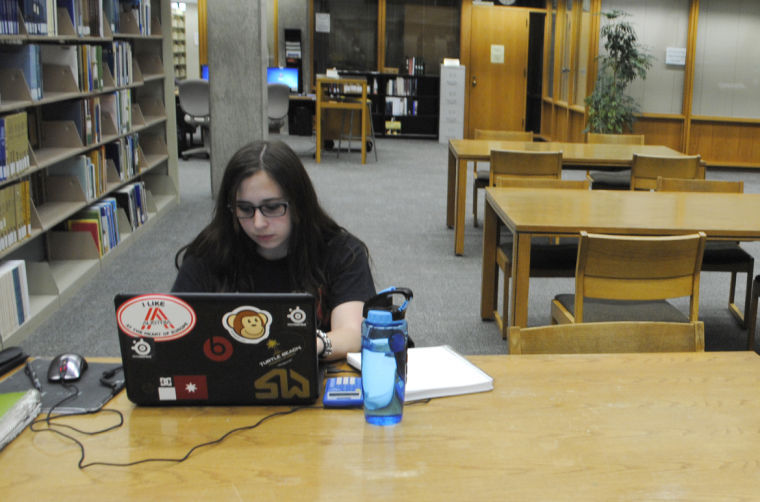Gen. eds to change based on feedback
Brandi Tibbitts, sophomore environmental studies major, studies for her finals Thursday at Founders Memorial Library.
May 5, 2014
After receiving feedback from faculty and students, the PLUS Task Force is looking to make final adjustments to general education.
The PLUS Task Force, which was assembled a year ago, is a group of faculty and students working on issues associated with general education. The members were appointed by Raymond Alden, former executive vice president and provost, to take part in adjusting NIU’s general education curriculum.
After the NIU General Education and Integrative Learning Symposium held by the general education committee in January, the NIU PLUS Task Force conducted feedback sessions where students and faculty discussed their thoughts on general education.
“Most students don’t feel positive sentiments towards general education at all … . We polled students and only 8 percent … could say something positive,” said Michael Kolb, general education coordinator and archeology professor.
The Task Force has three potential models for general education change. The models feature statistics and comparisons on experiential learning, content exposure and learning outcomes.
“It’s very important to integrate the curriculum,” Kolb said. “One component of NIU PLUS is to relate our existing [general education] courses to contemporary problems.”
Kolb said he wants students and faculty to realize the benefits of other general education courses, as many of them offer a well-rounded education for students.
Kolb said the Task Force is targeting community colleges and alumni for feedback on general education and what students need to bring to the workforce.
“Employers are saying, in general, we aren’t getting those students trained properly, and educators are saying we are training them right,” Kolb said.
After receiving all of the feedback, the Task Force hopes to create a new model for the fall semester. From this model, the Task Force hopes students and faculty realize the majority of general education has value and can benefit students, Kolb said.
After reviewing feedback, Kolb said the Task Force is considering having general education in the form of a minor. The general education minor would allow a student’s major to blend with relatable minor courses.
Ultimately, each general education course will make each student a T-student, Kolb said. A T-student has a balance of depth of education that varies along with qualities in critical thinking, creativity and good communication skills.
As head academic adviser, Lisa Freeman, interim executive vice president and provost, said a well-rounded education is key and the Task Force is taking steps to make sure that is possible.
“I think the vision of the NIU PLUS Task Force is a good, solid and excellent vision,” Freeman said. “I think that the courses that we offer in the first two years only go part of the way to realizing that larger vision, and what we are trying to do now is make sure that what we offer students fits with the goals that we have.”
With the search for the executive vice president and provost ending soon, Kolb, Vice Provost Anne Birberick and Freeman will help the provost understand the Task Force’s mission to reform general education.
“There are many models of how to do the general education program well and the committee is being careful to investigate different options for our students,” said anthropology professor Kristen Borre.
Borre, a professor of general education courses, said the Task Force is working hard to eliminate problems with general education and the members’ ideas will benefit NIU.







